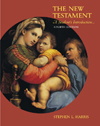 |
1 |  | 
Matthew is the only New Testament Gospel to use the term ekklesia, which means _________________. |
|  | A) | church. |
|  | B) | love. |
|  | C) | salvation. |
|  | D) | persecution. |
 |
 |
2 |  | 
Which of the following is NOT a characteristic of the Gospel of Matthew that emphasizes the Gospel's strong connection to the Hebrew Bible? |
|  | A) | Matthew describes in detail the Hebrew lineage of the apostle Matthew. |
|  | B) | Matthew provides a genealogy of Jesus' ancestors that traces his lineage back to Abraham. |
|  | C) | Matthew stresses Jesus' fulfillment of ancient prophecies in the Hebrew Bible. |
|  | D) | Matthew stresses that Jesus both taught and fulfilled the principles of the Mosaic Law. |
 |
 |
3 |  | 
The tradition widely accepted in the early church is that the author of Matthew held the profession of __________________. |
|  | A) | tax collector. |
|  | B) | physician. |
|  | C) | fisherman. |
|  | D) | soldier. |
 |
 |
4 |  | 
In Matthew, Jesus commonly teaches by providing detailed interpretations of the meaning of the Mosaic Torah. These detailed interpretations are known as ________________. |
|  | A) | midrash. |
|  | B) | Talmud. |
|  | C) | Magi. |
|  | D) | Sheol. |
 |
 |
5 |  | 
Many scholars cite Rome as the probable place of composition of the Gospel of Matthew. |
|  | A) | True |
|  | B) | False |
 |
 |
6 |  | 
One of Matthew's primary purposes for writing his Gospel is to demonstrate Jesus' credentials as Israel's true Messiah. |
|  | A) | True |
|  | B) | False |
 |
 |
7 |  | 
Which of the following sources do most scholars NOT think Matthew used in composing his Gospel? |
|  | A) | L |
|  | B) | M |
|  | C) | Mark |
|  | D) | Q |
 |
 |
8 |  | 
The only two Gospels to describe the circumstances of Jesus' birth are Matthew and Luke. |
|  | A) | True |
|  | B) | False |
 |
 |
9 |  | 
The Magi or "wise men" who come searching for the infant Jesus in Matthew were probably ________________ by profession. |
|  | A) | kings |
|  | B) | travel guides |
|  | C) | astrologers |
|  | D) | soldiers |
 |
 |
10 |  | 
When Satan tempts Jesus in the wilderness in the Gospel of Matthew, Jesus responds to Satan each time by quoting from the Hebrew Scriptures. |
|  | A) | True |
|  | B) | False |
 |
 |
11 |  | 
The Sermon on the Mount in Matt. 5-7 is the most extensive collection of Jesus' teachings and admonitions in the Synoptic Gospels. |
|  | A) | True |
|  | B) | False |
 |
 |
12 |  | 
The "Beatitudes" that Jesus pronounces in the Sermon on the Mount express a radical confirmation of the present world's social values. |
|  | A) | True |
|  | B) | False |
 |
 |
13 |  | 
In the Sermon on the Mount, Jesus rejects the principle of lex talionis or the _________________. |
|  | A) | rule of law. |
|  | B) | presumption of innocence. |
|  | C) | golden rule. |
|  | D) | law of retaliation. |
 |
 |
14 |  | 
The word Jesus commonly uses for hell in the Gospel of Matthew is "Shema." |
|  | A) | True |
|  | B) | False |
 |
 |
15 |  | 
Matthew is the only Gospel in which Jesus tells the apostle _____________, "On this rock I will build my Church." |
|  | A) | Paul |
|  | B) | John |
|  | C) | Peter |
|  | D) | Thomas |
 |
 |
16 |  | 
In Matthew's account of Jesus' Jerusalem ministry, Jesus is repeatedly hailed as "Son of Man," one of Matthew's favorite designations for Jesus. |
|  | A) | True |
|  | B) | False |
 |
 |
17 |  | 
In Matthew 23, Jesus delivers a series of blistering "woes" upon ___________________, claiming that these persons bear the burden for the collective wrongdoings of Israel down through the nation's history. |
|  | A) | tax collectors and sinners |
|  | B) | lawyers and politicians |
|  | C) | Zealots and Herodians |
|  | D) | scribes and Pharisees |
 |
 |
18 |  | 
To stress the earth-shattering significance of Jesus' crucifixion, the Gospel of Matthew reports that Jesus' death was accompanied by an earthquake. |
|  | A) | True |
|  | B) | False |
 |
 |
19 |  | 
Only the Gospel of Matthew reports that the Sadducees plotted to bribe the soldiers guarding Jesus' tomb into claiming that Jesus' disciples stole his bodies while the soldiers slept. |
|  | A) | True |
|  | B) | False |
 |
 |
20 |  | 
The Gospel of Matthew ends with the resurrected Christ calling his believers to make disciples of _______________. |
|  | A) | tax collectors and sinners. |
|  | B) | members of all nations. |
|  | C) | scribes and Pharisees. |
|  | D) | Zealots and Herodians. |
 |



 2002 McGraw-Hill Higher Education
2002 McGraw-Hill Higher Education